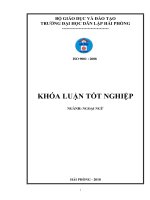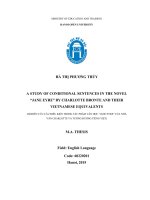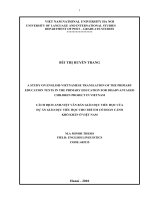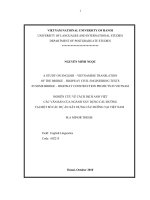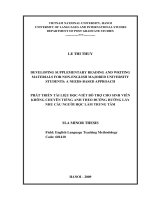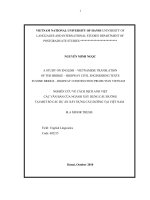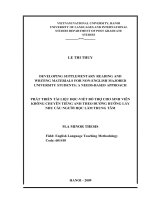A study of english vietnamese translation of conditional sentences
Bạn đang xem bản rút gọn của tài liệu. Xem và tải ngay bản đầy đủ của tài liệu tại đây (113.52 KB, 13 trang )
1
MINISTRY OF EDUCATION AND TRAINING
UNIVERSITY OF DANANG
NGUYỄN THỊ NGỌC HOA
A STUDY OF ENGLISH–VIETNAMESE
2
The study has been completed at College of Foreign languages,
University of Danang
Supervisor: PHAN THỊ BÉ, M.Ed.
Examiner1: LÊ TẤN THI, Ph.D
TRANSLATION OF
CONDITIONAL SENTENCES
Field: THE ENGLISH LANGUAGE
Code: 60.22.15
Examiner2: TRƯƠNG VIÊN , Ph.D
This thesis was defended at the Examination Council for the
M.A. thesis, University of Danang.
Time:
Vanue: University of Danang
M.A. THESIS IN THE ENGLISH LANGUAGE
(A SUMMARY)
Supervisor : PHAN THỊ BÉ, M.Ed.
DANANG - 2011
The original of this thesis is accessible for the purpose of
reference at:
- Library of the College of Foreign languages, University of
Danang
- The Information Resources Center, University of Danang.
3
4
CHAPTER 1
own language, the lack of language competence, the lack of
INTRODUCTION
background and cultural knowledge from the translators are some of
1.1. RATIONALE
the reasons for many difficulties in translation.
With the development of science and technology, we are living
I myself have difficulties in translating these kinds of sentences
in the context of cross-culture and globalization. English has really
and I find it interesting to do research on this problem. For these
become the international language for all the nations to exchange the
above reasons, the paper entitled “A study of English –Vietnamese
ideas, share their own culture and cooperate with one another in
Translation of Conditional sentences " is intended to help the
every field in life. In that situation, the needs of exchanging
learners of English overcome difficulties caused by this kind of
information, technology, co-operating for peace and development
sentences when they translate them.
between nations require translation. Translation is an activity that is
1.2. AIMS AND OBJECTIVES
going on all time. With the useful help of translators and interpreters,
1.2.1. Aims
our wide world becomes closer.
The study is expected to provide Vietnamese learners with the
Conditional sentences are one of the most popular sentences in
approaches of translating conditional sentences and some ways to help
the English language, but they are not easily used at all. After many
Vietnamese learners of English overcome the difficulties in translating
years of teaching English at high schools, I realize that students have
English conditional sentences. The researcher also hopes to provide
some difficulties in translating conditional sentences.The uses and
teachers and students with knowledge of the translation of English
the meaning of conditional sentences are abundant and diverse. Many
conditional sentences.
students know how to use conditional sentences, but they do not pay
1.2.2. Objectives
much attention to their meanings in translation.
- To identify the approaches of translating English conditional
(1)
If you apply pressure on water, water does not shrink in
sentences.
volume.
- To find out the ways to help Vietnamese learners of
English overcome the difficulties in translating English
conditional sentences.
[64, p.10]
(Về thể tích, quả thật là nước sẽ khơng co lại khi bạn đặt áp
suất lên nước.)
(6)
“If something begins well, it ends well.”
[42, p.28]
- To suggest some implications for teaching and learning
(“Đầu xi đi lọt.”)
English conditional sentences.
It seems that it is not easy to translate conditional sentences
1.3. SCOPE OF THE STUDY
clearly and persuasively. Besides, translation is an activity related to
This study is confined to English-Vietnamese conditional
source language and target language. The lack of equivalence in each
sentences. However, due to the time and the length limit, this study is
5
6
confined to some approaches of translating English conditional
sentences
with
examples
taken
from
English
–Vietnamese
magazines, short stories and novels, not from Vietnamese – English
materials.
B.Hatim and I.Mason (1989) analyzed the relation between
translation and other factors that are related to translating process
such as context, structures and pragmatics.
Towards the Vietnamese-English translation, in many works
1.4. METHODOLOGY
of Ho Van Hoa (2001), he mostly discussed paper translation. Or
Descriptive and analytic methods are also used to do the study.
Tran Phu Thuyet (2002), in the book “ Học Dịch Tiếng Anh Chính
Description is intended to follow a qualitative approach. The data are
Xác Hơn”, or Minh Thu- Nguyen Hoa (2001) in “Luyện Dịch Việt
collected, the description of the translation of conditional sentences is
Anh” introduced many useful ways helping Vietnamese learners of
given.
English translate more exactly.
1.5. RESEARCH QUESTIONS
1. What are approaches of translating English conditional
sentences?
“Link words in English in comparison with Vietnamese” by
Le Thi Giao Chi(1997) has successfully systematized English and
Vietnamese link words for different semantic relations , among
2. What are some ways to help Vietnamese learners of English
overcome the difficulties in translating English conditional sentences?
which concession and condition are mentioned.
“Different ways to express condition and concession in
1.6. ORGANIZATION OF THE STUDY
English and Vietnamese” by Vo Thi Kim Anh has found out the
Chapter 1: The Introduction
semantic, syntactic and pragmatic features of all ways to express
Chapter 2: Literature Review and Theoretical Background
condition and concession.
Chapter 3: Method and Procedure
2.2. THEORETICAL BACKGROUND
Chapter 4: Finding and Discussion
2.2.1. Translation
Chapter 5: The Conclusion and Implications
Peter Newmark 1982 [49, p.25], translation is a craft
CHAPTER 2
consisting in the attempt to replace a written message and/or
LITERATURE REVIEW
statement in one language by the same message of textual material
AND THEORETICAL BACKGROUND
in one language into another language in the way that the author
2.1. PREVIOUS STUDIES RELATED TO THE TOPIC
“Approaches to Translation” by Peter Newmark (1982)
intended the text.
2.2.2. Translation Equivalence
provides learners and translators with basic knowledge in doing
“Translation is a matter of subjective interpretation of
translation. In translation, Newmark prefers the term “semantic and
translators the source language text” while “the sameness
communicative translation”.
cannot exist between two languages.” Therefore, an objective
7
8
effect that the translators hope to make on target-text readers
introduced by the sub-ordinators if (positive condition) and unless
like on the source-text readers is an unrealistic expectation.
(negative condition) [51, p.324]
2.2.3. Translation Procedures
2.2.6.2 Types of Conditional Clauses
2.2.4. Translation Methods
Table 2.1: Types of English Conditional Clauses and their Basic
Newmark writes that, “While translation methods relate to
whole texts, translation procedures are used for sentences and
Syntactic Features
Type
Main Clause
If Clause
the smaller units of language” [10, p.18]
According to Peter Newmark (Approaches to Translation, p.
39), these two methods are shown in the following chart:
Source language bias
Target language bias
Literal
Zero conditional Present simple tense
Present simple tense
1st conditional
Future tense
Present simple tense
2nd conditional
Present conditional tense Past subjunctive
3rd conditional
Perfect conditional
Free
Faithful
Idiomatic
Past perfect tense
Table 2.2: Types of Mixed English Conditional Clauses and their
Basic Syntactic Features
Semantic / Communicative
2.2.5. Importance of Context in Translation
Situational context refers to the factors of situation and
circumstances influencing the meaning of a text. These factors are
little harder to be recognized than linguistic ones. The situational
factors may pertain to the facial expressions, gestures and stances at
Type
Main Clause
If Clause
Present conditional
Past perfect
Past result of present or
Perfect conditional
continuing condition
Simple past
Present result of
past condition
micro level and the social, political and economical milieu and the
culture at large.
2.2.6 . Conditional Sentences
2.2.6.1. Definition of Conditional Sentences
According to Randolph Quirk (1987), conditional clauses state
the dependence of one circumstance or set of circumstances on
another [49, p.323] finite adverbial clauses of condition are
2.2.6.3. Link words signaling Condition in English
English conditional sentences are obviously rich in meaning
thanks to a variety of conditional signals with various meanings.
Therefore, a number of pragmatic functions can be found in
communication. Such link words are often used: unless, providing
that/ provided that, as long as, only if, if... only, on the condition
that, assuming that, given that, supposed that/ supposing that,,…
9
10
CHAPTER 3
(Nếu có bụi phóng xạ trên bàn tay của Cơ, máy dị tìm sẽ biết
ngay tức khắc. Một tín hiệu báo ñộng reo lên khắp nhà máy.)
METHOD AND PROCEDURE
3.1. RESEARCH DESIGN
+ In examples (67) - (72), the things in conditional sentences
3.2. RESEARCH PROCEDURE
are always true and always happen under certain conditions. They are
3.3. DATA COLLECTION AND ANALYSIS
scientific facts and general truths. The translation of zero conditional
3.3.1 Sampling
sentences in these examples is quite usual in English- Vietnamese. In
3.3.2 Instrumentation
most cases, the semantic translation is used. “if”, “unless” and
3.3.3 Data processing
“when” are often used, and are translated as “Nếu”, “trừ khi” and
CHAPTER 4
“khi” respectively.
DISCUSSION OF FINDINGS
By
studying
English
conditional
sentences
4.1.1.2. First type conditional sentences to denote possibilities
and
their
in the present or in the future
Vietnamese equivalents in bilingual novels, short stories, books and
The first type conditional sentences are very popular and can
public information, we have concluded that there are three
be found in many kinds of discourse: in scientific discourse, in
approaches of translating English conditional sentences as follows:
technological discourse or in fictive discourse. The translation of first
+ Based on types of conditional sentences
type conditional sentences is also quite semantic.
+ Based on pragmatic functions or writer’s intention
(73) I’ll continue to help you learn English as long as a mistake
+ Based on situational contexts
may appear in your speaking it.
[20, p. 30]
4.1. SOME APPROACHES OF TRANSLATING ENGLISH
(Mình sẽ vẫn tiếp tục giúp bạn học tiếng Anh hễ mà bạn nói
CONDITIONAL SENTENCES
tiếng Anh còn phạm lỗi.)
4.1.1. Based on Types of Conditional Sentences
+ In examples (73) - (79), the things in conditional sentences
4.1.1.1 Zero conditional sentences to denote scientific facts
and general truths
possibly happen in the present or in the future. The semantic
translation is also quite popular. In this case, conditional clauses can
Usually, the translation of zero conditional sentences is often
be translated as “ Nếu, ngộ nhỡ, nếu nhỡ mà, nếu may ra ” and
quite semantic. This way of translation is often found in scientific
“unless” means “ trừ khi”, “ as long as” “hễ mà, miễn là”,.... and
discourse. We often find zero conditional sentences in scientific
main clauses are translated as “ sẽ”, “thì”,...
books and magazines.
4.1.1.3 Second type conditional sentences to denote unreal
(67) If there’s any radioactive dust on your hands, the scanner
knows at once. An alarm rings all the factory
[42, p.12]
situations in the present or in the future
11
12
(78) If an atom were the size of your fingernail, your hand would be
to (83) are unreal in the present or in the future. Like the first type
want to talk about events that happened or did not happen in the
past and the present results of those events. This kind of mixing
of conditional types is not uncommon and the tendency of
translation is semantic.
(85) We'd be able to afford a better holiday if you hadn't
wasted so much money last week.
[3, p.41]
conditional sentences, the semantic translation is also quite popular.
(Giá mà tuần trước anh đã khơng lãng phí q nhiều tiền bạc
In this case, conditional clauses can be translated as “nếu, nếu như,
như thế thì bây giờ chúng ta có thể có kỳ nghỉ tốt hơn.)
giả sử”, and main clauses are translated as “ sẽ”, “thì”,...
+ In (85) – (89), the mixed conditional sentences are often
big enough to hold the earth.
[64, p.8]
(Nếu một ngun tử có kích cỡ của móng tay bạn thì bàn tay
bạn sẽ lớn ñủ ñể giữ cả trái ñất.)
+ The second conditional sentences used in examples from (80)
4.1.1.4. Third type conditional sentences to denote unreal
translated semantically and in Vietnamese, they can be translated as
“nếu ngày ấy... thì bây giờ..., giá mà trước đây... thì bây giờ...”
situations in the past
The third conditional sentences are unreal in the past and the
In sum, in the examples above, based on their types, English
tendency of translation is semantic. This kind of conditional
conditional sentences can be translated semantically. Generally, we
sentences can often be found in many kinds of discourse, especially
can see that in the examples (67) – (89), beside if, English
in fictive discourse.
conditional sentences are also used with other link words , such as,
(82) We c ouldn’t have known it if Miss Melly’s aunt hadn’t let
unless, when, as long as, if only, in case, on the condition that, ...
it out.
[32, p.11]
and have different Vietnamese equivalents. In main clauses,
(Chúng tơi có thể đã khơng biết điều đó nếu mà cơ của Cơ
depending on types of condition, verb phrases can be translated as
Melly khơng để lộ ra.)
“sẽ..., có lẽ đã, có thể đã..../ ắt hẳn đã.../ lẽ ra nên...”
+ In (84) – (88), the translation of the third conditional
Table 4.1. The summary of the ways of translating English
conditional sentences based on their types
sentences is quite semantic. In English , the third type conditional
sentences can be used with “ must/should /might /...+ have+ past
Types
Functions and Vietnamese equivalents
participle” and in Vietnamese, they can be translated as “chắc hẳn
zero
- To express the things which are always true ,
là, lẽ ra nên, có lẽ đã,...” .
conditional
such as scientific facts and general truths
sentences
- And in English, “if”, “unless” and “when” are
4.1.1.5. Mixed type conditional sentences
The four types of conditional sentence discussed above
appear to fit into very rigid patterns of form and meaning but
we often find exceptions to these rules. In many cases we may
often used to signal condition , in Vietnamese,
these link words are translated as “ Nếu” , “trừ
khi” and “khi” respectively.
13
1st
type - To imply that the action in “If clause” is quite
14
According to speech acts, conditional sentences belong to
conditional
probable.
illocutionary acts. Illocutionary acts include such acts as stating,
sentences
- Applied to pure conditional sentences- including
requesting, questioning, promising, apologizing, appointing,…
condition and result. The result will appear if the
nd
condition satisfies.
literal meanings, but basing on the writer’s intention. The tendency of
- Links in conditional clauses can be translated as
translation is sometimes semantic and sometimes communicative.
“ Nếu, ngộ nhỡ, nếu nhỡ mà, nếu may ra ” and
4.1.2.1. As Threatening
“unless” means “ trừ khi”, “ as long as” “hễ là,
Conditional sentences are often used to imply threat when we
miễn là”,.... and verb phrases in main clauses are
wish to raise the politeness of utterance and reduce the level of
translated as “ sẽ”, “thì”,...
threatening.
type - To describe something that is reasonably
2
So, here we translate conditional sentences not basing on their
(90) If you strike that dog again, I’ll kill you.
[81, p61]
conditional
impossible and contrary to the known fact.
(Tao thề sẽ giết mày nếu mày cịn đánh con chó này nữa.)
sentences
- Links in conditional clauses can be translated as
+ The conditional sentences in (90) – (94) are translated as
“nếu, nếu như, giả sử”, .... and verb phrases in
threat and we can infer that from fragmatic function of the sentences.
main clauses are translated as “sẽ”, “thì”,...
The way of translation is communicative. In Vietnamese the words
- To express what didn’t happen in the past.
“thề, thề rằng” or “ ñe dọa, dọa rằng...” are used to make the
rd
type - To express living experiences, truths, ....
3
meaning of the sentences clearer.
conditional
- Result clauses contain “ must/should /might
4.1.2.2. As Advising
sentences
/...+ have+ past participle” and translated as
In communication, advising is the most common function of
“chắc hẳn là, lẽ ra nên, có lẽ đã,...”
conditional sentences.
Mixed
- In main clauses, depending on types of
(95) If I were him I would put in everything now and go until
conditional
condition, verb phrases can be translated as “sẽ...,
something broke.
sentences
có thể đã..../ ắt hẳn đã.../ lẽ ra nên...”
(Ta khuyên hắn dốc hết sức bình sinh kéo cho dây ñứt tung hết
4.1.2. Based on Pragmatic Functions of Conditional
Sentences or Writer’s Intention
In this approach, the author wishes to show some pragmatic
functions that influence the translation of conditional sentences.
[80, p.22]
cả lên.)
+ In English, with this pragmatic function, imperative form or
“should” is often used in the main clause, the conditional clause
contains “If I were you,...” or auxiliary “should”. Similarly, in
15
16
Vietnamese, we can use khuyên, nên, hãy,...The tendency for
should be used and the main clause is often seen in the form of a
communicative translation is applied.
question in simple present or with a modal verb and we often use “ If
4.1.2.3. As Warning
I want.../I want to .../ If you can.../ can I do... / what can I do..?”.
To make a conditional sentence a warning, situational
(110) If it’s light enough after dinner, I want to take you down to the
information is expected to presuppose that it is not clear that the
stables.
[31, p.29]
hearer knows the event will occur, the speaker does not think the
(Nếu ăn xong mà cịn sáng, tơi muốn đưa cậu xuống chỗ
event will occur and the event will not have a beneficial effect.
chuồng ngựa nhé.)
(99) If we did not give them liberty, they would take it. [55, p 347]
+ The conditional sentences in these samples are translated
(Họ cảnh báo trước sẽ giành tự do nếu chúng ta không thả tự
with the help of yêu cầu, nếu muốn, nhé, ñấy nhé, hãy, chứ to raise
do cho họ)
the politeness of request. In most examples investigated above, the
+ In English, to express warning, people often use “if you take
tendency for semantic translation is applied.
my advice, ...; If my experience is anything to go by, you should
4.1.2.6. As Suggesting
(not)....,. Similarly, in Vietnamese, we can use “ tôi cảnh báo anh,
Similar to requesting, conditional sentences should be used to
theo kinh nghiệm của tôi, tôi báo trước, tơi nói trước,...” The
make suggestions and the main clause is often seen in the form of a
tendency for communicative translation is applied.
question in simple present or with a modal verb and we often use “ If
4.1.2.4. As Criticizing
you like, if I might make suggestion,...”.
When using conditional sentences to criticize other people, the
(115) You can come up, if you like.
[26, p. 295]
speaker also includes his complaint.
(Anh có thể đến nếu anh thích nhé .)
(105) If he had been a young, attractive gentleman, I would not have
+ The conditional sentences in these samples are translated
felt ashamed to help him.
[52, p.88]
(Giá như ông ta là người lịch sự, trẻ trung và quyến rủ, ắt tơi
with the help of “nhé, có được khơng, ñấy nhé, hãy, tại sao không
” to raise the politeness of suggestion.
đã khơng q xấu hổ khi giúp hắn ta.)
4.1.2.7. As Regretting
+ When criticizing other people, conditional clauses in this
Conditional sentences can be used to express a regret . And to
function are counterfactual and in Vietnamese, we can use “giá mà,
express a regret, we often use the third type conditional sentences.
nếu ... thì đã khơng, nếu thực sự ... thì...” In most examples
(119) If you had done your exercise as I told you, you couldn’t have
investigated above, the tendency for semantic translation is applied.
failed.
[54, p.34]
4.1.2.5. As Requesting
(Giá mà bạn làm bài tập như tơi bảo bạn thì bạn đã khơng thi
To make a polite request more polite, conditional sentences
rớt.)
17
18
+ In fact, the regretting feeling of the speaker is expressed
• If you take my advice, ...........
through the semantic implication of modal perfect “ would have +
• If my experience is anything to go by, you
past participle” Moreover, we can use “if only” to express a regret.
should(n’t).....
In Vietnamese it means “ giá mà, tiếc rằng, tiếc là ”
• tơi cảnh báo anh
4.1.2.8. As Softening
• theo kinh nghiệm của tơi
Conditional sentences are also used to soften what conveyed in
• tơi báo trước / tơi nói trước
the saying. When we are going to say something that may make
Criticizing
• If I had(n’t) + pp , I would have + pp
others hurt , or irritated , we often use such conditional clauses as “if
• If I had(n’t) + pp , I would + V
I may say so” , “if you don’t mind...” , “If you see what I mean” ,
• khơng đễnh đãng
“if I’m not mistaken...” and in Vietnamese, they can be translated
• nếu tao mà ngớ ngẩn như mày
as “nếu tơi có thể nói vậy, nếu bạn khơng cảm thấy phiền, nếu
• Nếu thực sự em tin anh
bạn hiểu điều tơi ngụ ý,...”
Requesting
(124) And you are Mr. Allan Kelling, the owner of this property, if
I’m not mistaken.
• If I want.../ I want to ...
• If you can.../ can I do...?
[22, p.44]
• what can I do.....?
(Nếu tơi khơng nhầm thì ơng là Allan Kelling,chủ nhân của
• nếu muốn
tài sản này)
• nhé
Table 4.2 The summary of the ways of translating English
• đấy nhé
conditional sentences based on pragmatic functions
Pragmatic
functions
Threatening
Conditional sentences
Vietnamese equivalents
• hãy
Suggesting
• If I might make suggestion,..
• Nhé / đấy nhé
• If you....., you will.....
• có được khơng
• thề /thề rằng
• hãy
• đe dọa /dọa rằng
Advising
• If I were ......... , I would / should .......
• khuyên / nên / hãy,...
Warning
• If you................., don’t ....................
• If you take my advice, you should ............
• If you like
• tại sao khơng
Regretting
• If/ If only + S had(n’t) + pp , S+ would
have + pp
• Giá mà
19
Softening
•
if I may say so
•
if you don’t mind...
•
If you see what I mean
•
if I’m not mistaken...
•
nếu tơi có thể nói vậy
•
nếu bạn khơng cảm thấy phiền
•
nếu bạn hiểu điều tơi ngụ ý,...
20
situations where conditional sentences are produced to translate.
Proverbs are often translated in this way.
(133) If you run after two hares, you will catch neither.
[75,p 40]
(Lắm mối tối nằm không.)
+ In (133) – (137), the translation of the conditional sentences
depends on the context. In order to translate these sentences,
idiomatic translation is used . So to translate these sentences is not
just to look up a word in dictionary, choose the suitable meaning,
4.1.3. Based on Specific Situational Contexts
and put it in the translation, but graspe the context and consider if
Based on situational contexts, zero conditional sentences and
the meaning is suitable in the text.
first type conditional sentences are translated to express true facts or
4.2. SOME WAYS TO HELP VIETNAMESE LEARNERS OF
factual events in our life. Calculations in maths, formulations in
ENGLISH OVERCOME THE DIFFICULTIES IN TRANSLATING
maths and chemistry, sets of chemical reactions and experiences in
ENGLISH CONDITIONAL SENTENCES
life are often based on this way. We often find the way of translation
in scientific discourse: in maths, physics, chemistry, in technology,…
or in proverbs, such as followings:
English conditional sentences
Frequently, when coming across a conditional sentence,
4.1.3.1 In scientific discourse
(128) If you divide 21 by 3, the answer is 7.
4.2.1. Some mistakes that learners often have in translating
learners pay much attention to the syntactic features , for instance,
[45,p 85]
how tenses are used in the clauses. Besides, some link words such as
(21 chia 3 bằng 7)
“if” and “unless” are paid much attention to while other link words
+ We can easily realise that from examples (128) – (132) that
explicitly expressing condition are ignored. Learners often translate
we have investigated, conditional sentences are translated in different
word by word without noticing pragmatic functions and without
ways and their Vietnamese equivalents are quite different. Free
putting it in real contexts. Therefore, a big hole in learners’
translation is used here.
translating knowledge can be found.
4.1.3.2 Experiences in life
In some cases, basing on situational contexts, conditional
sentences can be translated more effectively and persuasively.
Sometimes, we need to pay much attention to surrounding words,
phrases,… to translate. Sometimes we need to pay attention to the
The followings are examples related to mistakes that learners
often have.
+ Difficulties in translating different types of English
conditional sentences into Vietnamese.
21
22
+ Difficulties in understanding pragmatic functions of English
conditional sentences
(Miễn là chị đặt vài chiếc gối quanh em, em có thể ngồi dậy
và xem chị nấu nướng.)
+ Difficulties in interpreting English conditional sentences in
contexts
In translating the first type conditional sentences, learners need
to pay much attention to condition and result to choose suitable
4.2.2. Ways to help learners overcome difficulties in
translating English conditional sentences
Vietnamese link words .
c- With the second type conditional sentences
4.2.2.1. Supplying learners with adequate knowledge of types
of English conditional sentences and their Vietnamese equivalents
Almost all learners completely master the syntactic features of
“if” can be translated “Nếu, giả sử”, “ if only ” “giá mà, giá
như”, “ giả sử” “ giả sử .... thì ”.....
In translation, these words
are used to express unreal things in the present or in the future.
English conditional sentences. They can recognize and use tenses in
Therefore , learners should pay much attention to these words.
conditional sentences accurately. Learners should be supplied with
(157) If anything mastered, he would say it again.
[2, p. 32]
adequate knowledge of each type and Vietnamese words with
(Giả sử có chuyện gì quan trọng thì anh ta sẽ nói lại.)
specific meanings to help create good translation .
d- With the third and mixed type conditional sentences
a- With zero conditional sentences
In order to emphasize unreal things in the past , “chắc hẳn là,
Learners need to add “ khi, nếu, sự thật hiển nhiên là, ...” to
lẽ ra nên, có lẽ đã,...” are added in Vietnamese English translation to
translate things which are always true , such as scientific facts and
denote the coherence and flexibility.
general truths as follows:
(161) If she had gone straight to the Square she could have caught a
(146) If you apply pressure on water, water does not shrink in
volume.
[65, p.10]
train to Boston.
[52, p.23]
(Nàng ắt hẳn ñã bắt kịp chuyến tầu đi Boston nếu nàng đi
(Về thể tích, quả thật là nước sẽ không co lại khi bạn ñặt áp
thẳng ra ga)
suất lên nước.)
+ In summary, in the examples from (161) to (165), depending
b-With the first type conditional sentences
on types of conditional sentences, learners should choose suitable
Learners should know which link words should be used to
link words to add to their sentences in order to produce good
express the things happening in the present or in the future. “if” can
translation. Usually, “ nếu... thì, giá mà,miễn là, trừ phi....” are used
be translated as “ Nếu, ngộ nhỡ, nếu nhỡ mà, nếu may ra ” and
to translate
“unless” means “ trừ khi”, “ as long as” “hễ là, miễn là”,....
(151) As long as you put some pillows around me, I can sit up and
watch you cook.
[36, p.32]
4.2.2.2. Supplying learners with adequate knowledge of
pragmatic functions
Learners should be supplied with adequate knowledge of
23
24
pragmatic functions. At different levels, the teachers should pay
is of great significance in translation. However, it is hard for learners
attention to supplying suitable knowledge. Pragmatic function of
to understand implications of conditional sentences if they have to
conditional clauses should be introduced appropriately through
study the language in isolation. Contexts play a decisive role in
models.
translation.
(167) “ It will be easier if you take my arm,” he said.
[42, p.130]
(179) If you cannot bite, never show your teeth.
[84]
(Anh ta đề nghị nắm tay anh tơi sẽ thấy dễ chịu hơn.)
(Miệng hùm, gan sứa.)
+ In examples (169)- (170) , the words “ñe dọa”, “dọa” are
Without contexts, learners may have many difficulties in
used to express threat.
translation. Learners should master key words and guess them in
(171) If I were you, If she hit me with a stick, I’d seize it and break it
contexts so that words in translated version can reveal the author’s
under her nose.”
[12, p.52]
(Nếu bà ta dùng gậy đánh tơi, tơi khun bạn nên chụp nó và
bẻ gãy nó ngay trước mặt bà ta .)
intention accurately and naturally and may create attractive tone for
the translation.
To sum up, this chapter has clarified the approaches of
+ In examples (171)- (172) , the words “khuyên”, “hãy”, “ñi
translating English conditional sentences and found out ways to help
nhé” are used to express advice.
Vietnamese learners of English overcome the difficulties in
(174) If you marry her now, do not give you the time of day.
translating English conditional sentences.
[52, p.138]
(Tao báo trước nếu mày mà cứ cơ ta thì đừng có mà hỏi tao
cái gì dù chỉ là hỏi.)
+ In examples (173)- (174) , the words “cảnh báo”, “báo
trước” are used to express warning.
+ In summary, supplying learners with adequate knowledge of
pragmatic functions is necessary to help them have good translation .
CHAPTER 5
CONCLUSIONS AND IMPLICATIONS
5.1. CONCLUSIONS
With the task proposed in this thesis “A study of English –
Vietnamese Translation of Conditional sentences”, we have
provided an overview of different ways regarding to the translation of
English conditional sentences.
Furthermore, much attention should be paid to link words. Choosing
The study is of great linguistic value since it has found out the
the right link words will help learners convey their thoughts
approaches of translating English conditional sentences and some
successfully.
ways to help Vietnamese learners of English overcome the
4.2.2.3. Supplying with adequate knowledge of situational
contexts
Contextualizing ways to translate English conditional sentences
difficulties in translating English conditional sentences. More
importantly, we have supplied learners of English with full
descriptions and analyses of ways to translating English conditional
25
sentences successfully. From the result, we have given some
26
5.3. LIMITATIONS
suggestions on the translation of English conditional sentences. In the
Being aware that the Vietnamese translation of English
last part of the thesis, we think that the most valuable thing of the
conditional sentences is a topic of significance to Vietnamese
thesis is to supply Vietnamese learners of English with useful
learners, we have made a great effort in doing the research.
knowledge that can help learners know how to perform a translating
Nonetheless, owing to the limitation of time and ability as well as the
work effectively.
shortage of reference materials, the study still has inevitable
5.2. IMPLICATIONS
restrictions.
Teachers should help students use the knowledge effectively,
which can be achieved by constant practice in class under the
guidance of teachers at school and by self study at home.
5.4. SUGGESTIONS FOR FURTHER RESEARCHES
The study has focused on the approaches of translating English
conditional sentences and the ways to help Vietnamese learners to
Therefore, students should be provided with more opportunities
overcome difficulties in translating English conditional sentences.
to practise the translation of English conditional sentences. In fact,
The samples of conditional sentences were taken from bilingual
this study has provided some suggestions for teaching and learning
novels, short stories and public information.
English conditional sentences as follows:
Firstly, teachers should be aware of the importance and
advantages of English conditional sentences in maintaining
effectiveness and rhetorical effects.
Secondly, in order to help students improve their ability in
translating conditional sentences, teacher should design appropriate
exercises for the students to practise.
Thirdly, teachers should develop some effective techniques to
correct problems involved in the use of English conditional
sentences.
Fourthly, students should be provided with opportunities to
practise using and translating English conditional sentences in
context.
Therefore, the following aspects dealing with English
conditional sentences need further studies:
+ Ways of translating English conditional sentences in
newspaper headlines.
+ Ways of translating Vietnamese conditional sentences in
poems and folklore into English
